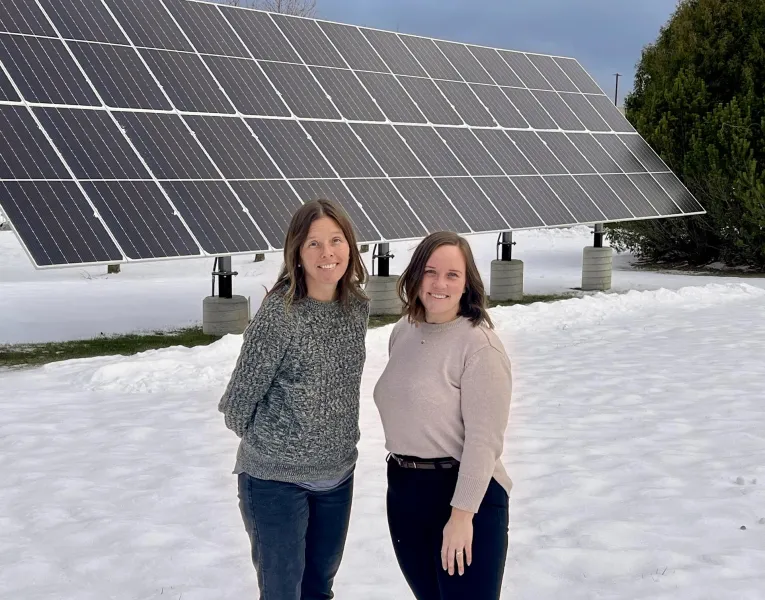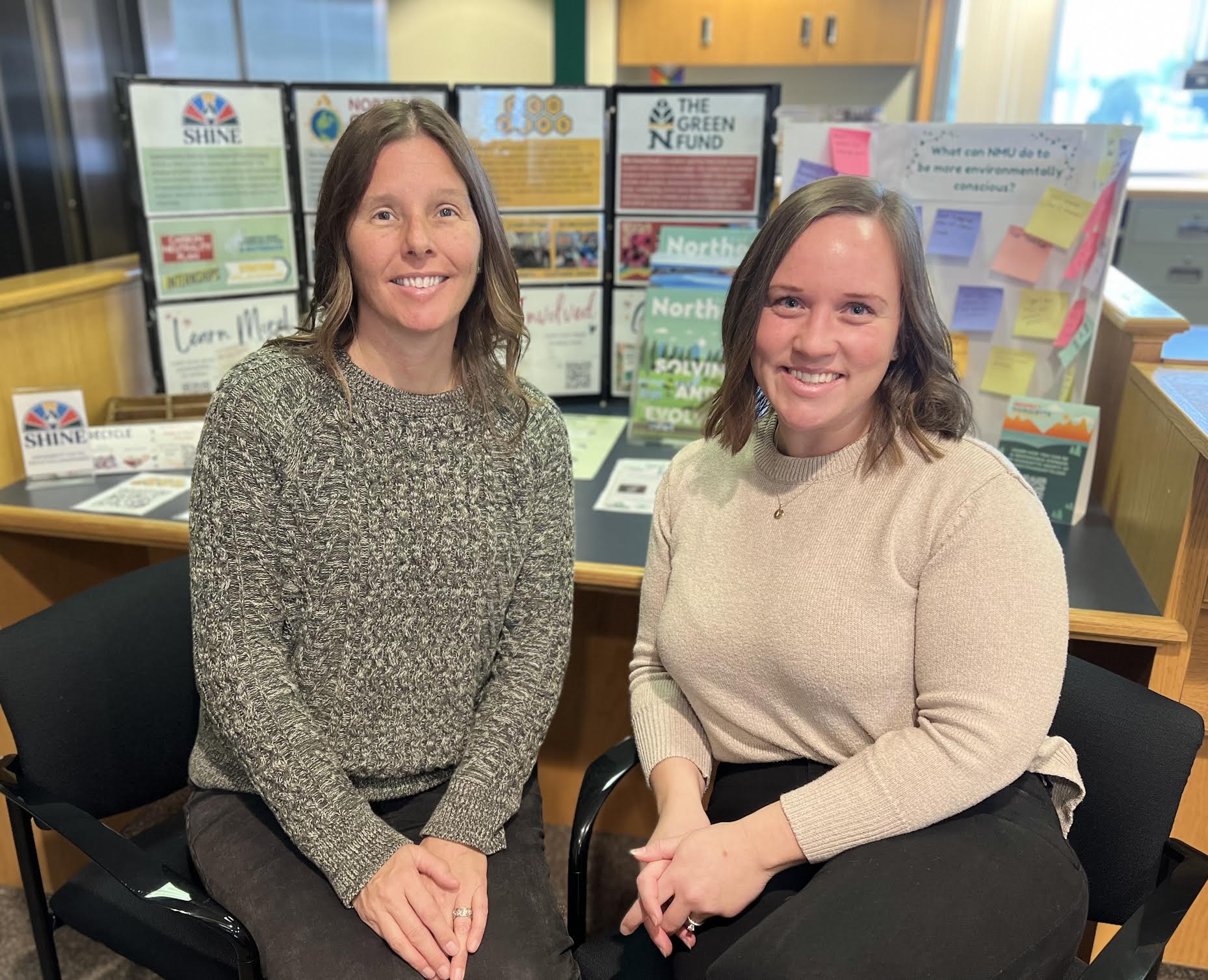Northern Michigan University successfully applied to host a member of the MI Healthy Climate Corps, a service program dedicated to developing an enduring, capable network of climate professionals committed to serving communities and building a more sustainable future for the state. NMU 2015 alumna and Negaunee native Anna Solberg has returned to campus to serve as MHC Corps climate action coordinator through October 2025. She will work with Assistant Vice President for Sustainability Jes Thompson to keep NMU aligned with its “Our Compass” strategic plan and carbon neutrality plan action items, as well as broader Michigan climate targets.
“I was thrilled to be able to return home and work to protect this particular space because it's so beautiful and one of a kind,” Solberg said. “I love the energy and ingenuity of a campus environment, but wouldn't necessarily want to teach. This is a great opportunity to work at a university, but in the sustainability sphere to combat climate change on campus and across the Upper Peninsula. It's different from my previous work in the policy arena, which is important, but takes a lot of time energy for potential. I'm excited to help implement things that will make a difference in the short time I'm here, and work with people who are very passionate about what needs to be done.”
“I think the coolest part is that not only is there a carbon neutrality plan for Michigan, but that we're doing similar work here at Northern. It's great to see the excitement President [Brock] Tessman has built around not only sustainability and the environment, but also the importance of protecting the students, faculty, staff and community and making sure that this is an overall healthy place to be. Sustainability factors into that, and it's incredible.”
Solberg earned her bachelor's in environmental studies and sustainability from NMU, followed by a master's and doctorate in geography from Kent State University in Ohio. She worked for a couple of years with the Conservation Voters of Pennsylvania and PennFuture. She had been trying to return to her hometown area and took advantage of the MHC Corps position available at her alma mater. Corps members earn a living stipend and benefit from career-focused networking, training and professional experience.
Thompson said she realized how much the Lake Superior Watershed Partnership and Marquette County benefitted from hosting members of the first MHC Corps cohort last year, and thought the timing was perfect for NMU to serve as a host site for the second year.
“We had a charge to come up with action items connected to carbon neutrality and sustainability as a grand challenge of ‘Our Compass,'” Thompson said. “We came up with 15 items ready to move. Several of them come out of the energy and emissions work Facilities is undertaking. But the other dozen or so intersect all over campus in different ways. I sat down with Anna to go over the full list. We selected five initiatives to pursue, based on her interests and expertise. Having a second person to help move these things forward is a game changer.”
The five action items are: coordinating a Feb. 18 Sustainability Summit to update campus and community members on progress made in that sphere and future directions; a new Woodland Park project near the apartments that will become a 20-acre food and forest learning area with a focus on Indigenous foods, medicines, foraging, and pollinator crops; identifying ways to reduce landfill waste during campus housing move-in and move-out activities; implementing the Green Fund, a fee students voted to pay in support of sustainable, student-led initiatives on campus; and collecting data on scope 3 emissions.
“We've done a pretty good job figuring out our scope 1 and 2 emissions, which are the fuel burned at the Ripley Power Plant and the natural gas burned at the Board of Light and Power that sends electricity here,” Thompson said. “Scope 3 is everything that's like one step removed from campus. It's you and I commuting to campus in our single occupancy vehicle, or it's the greenhouse gas emissions produced in the shipping of paper and products to campus. So this really requires doing an inventory of all the things that come in and go out of campus.
“I'm so excited Anna's here to help with these action projects. She literally doubles the capacity to get sustainability work done on campus. A year ago, there were zero people in this position, and now to have two of us working full time on these important initiatives is fantastic.”
MHC Corps members earn a living stipend and benefit from career-focused networking, training and professional experience. Solberg said the education provided by NMU's Earth, Environmental and Geographical Sciences (EEGS) Department prepared her well for this opportunity.
“My friends and I in EEGS would always joke that we didn't actually get a degree in environmental studies; we got a degree in critical thinking. It was all about preparing our brains for the real-life situations. There are so many components that go into what you're looking at, so critical thinking comes into play practically every moment of every day. That's the biggest and most valuable skill I learned in my environmental studies and sustainability program.”
The second MHC Corps cohort was recently announced by the Michigan Department of Environment, Great Lakes and Energy (EGLE). According to a press release, the new contingent will develop practical resources for Michiganders, bolster the state's clean energy and sustainability workforce, build climate action capacity in communities across the state, guide federal and state resources to communities in greatest need, and advance the MI Healthy Climate Plan and its goal of a prosperous, equitable, carbon-neutral Michigan economy by 2050.
“These 31 new MI Healthy Climate Corps members will gain valuable workforce and leadership skills while providing additional climate capacity to communities, universities, and nonprofits from Marquette to Metro Detroit,” said Phil Roos, director of EGLE, in the release. “With this program, we are fostering a new generation of leaders who are not only equipped for the workforce of the future but are dedicated to improving the lives of residents, bettering their communities, and building a more sustainable future for all Michiganders.”
Learn more about sustainability efforts at NMU via the Sustainability Hub for Innovation & Environment (SHINE) at nmu.edu/shine. Find more on the MI Healthy Climate Corps here.
Media contact: Jes Thompson (jessitho@nmu.edu or 906-227-1057)


